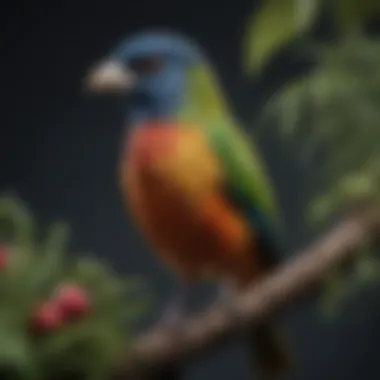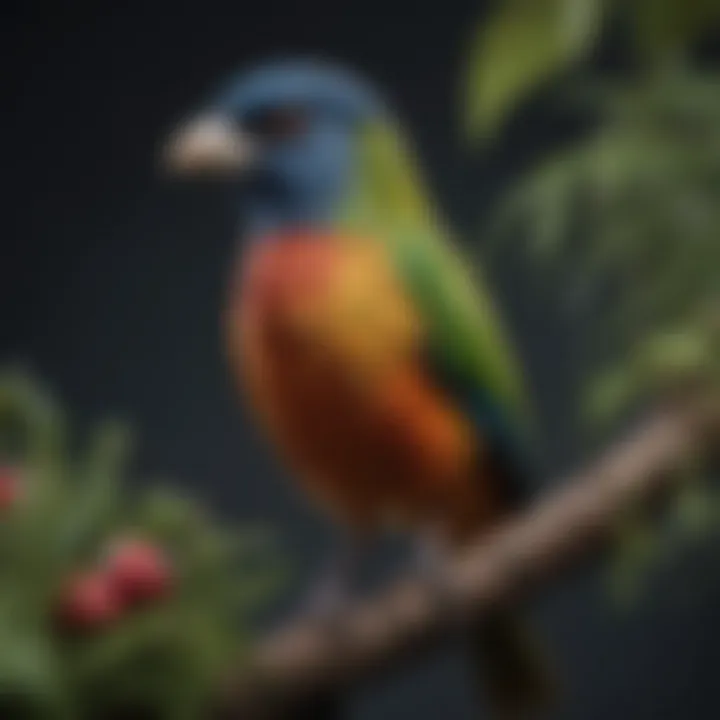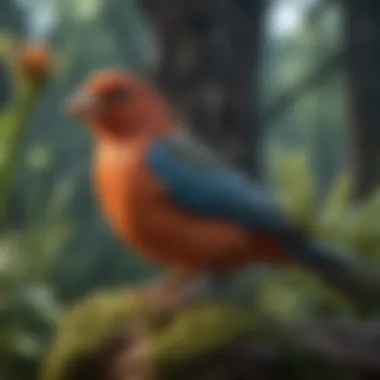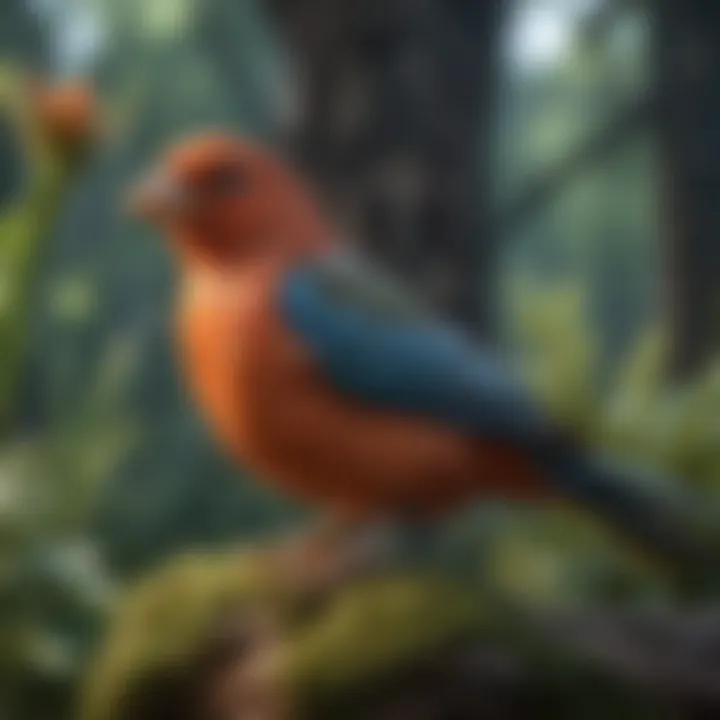Essential Guide to Caring for Carnivorous Pet Birds


Intro
The world of pet birds is as diverse as the feathers they don. Among them, the carnivorous species stand out due to their particular needs and fascinating behaviors. Unlike common pet birds, which may thrive on grains and fruits, carnivorous avian companions require a diet rich in proteins. Understanding their unique dietary requirements and care routines is key to keeping them healthy and happy.
In this article, we will navigate through the essentials of caring for carnivorous pet birds. We'll cover their nutritional needs, habitat setup, grooming and hygiene, emotional well-being, and much more. Navigating the landscape of bird ownership can be challenging, especially when misconceptions about their diets and care prevail. Our aim is to shed light on these aspects to empower both new and seasoned bird owners.
Proper care begins with understanding the nuances of a species’ specific needs. Without knowledge, even the most lavish setups can fall short.
By delving into the essential points and weaving through the complexities of bird care, we hope to provide you with comprehensive guidance that will enhance your bird-keeping experience.
Preamble to Carnivorous Pet Birds
Keeping pet birds can be a delightful pursuit, yet it brings with it unique challenges and responsibilities. For those attracted to carnivorous species, understanding their dietary and care requirements becomes even more paramount. These birds, though captivating in their behavior and appearance, have specific nutritional needs that must not be overlooked. This introduction serves to set the stage for a comprehensive guide aimed at educating current and potential bird owners about the nuances of caring for these avian companions.
Carnivorous birds are not just your run-of-the-mill pets. They require a deeper level of engagement and understanding from their owners. Each species brings its own set of habits, preferences, and challenges. When one considers the devotion needed to nurture a carnivorous bird, it becomes clear that awareness about their requirements isn't just a luxury — it's a necessity.
Defining Carnivorous Birds
Carnivorous birds, per definitions in avian literature, primarily consume a diet rich in animal proteins. These can range from insects to small mammals, and even fish in some cases. Such species showcase an array of hunting or foraging behaviors that highlight their evolutionary adaptations. For example, consider the unique approach of the Macaw. Indigenous to South America, a Macaw's diet in the wild revolves heavily around fruits, nuts, and seeds. However, when kept as pets, their owners must replicate these nutrient-dense sources to ensure optimal health.
So, when we talk about defining these birds, it’s essential to recognize that their carnivore status doesn’t just stem from their eating habits, but also from their anatomical and physiological features. Their strong beaks and agile hunting techniques can be seen as nature's design manifesting their role as predators. Ensure your understanding of the species you are interested in because different birds require different care and diets.
Significance of Proper Care
Proper care for carnivorous pet birds is critical for several reasons. First and foremost, it ensures that these birds thrive rather than merely survive. The well-being of carnivorous birds is deeply intertwined with their dietary intake and living conditions. Neglecting these aspects can lead to significant health problems, from malnutrition to behavioral issues.
It's also worth noting that proper care can foster a stronger bond between the bird and its owner. Just like a finely tuned watch, a carnivorous bird thrives on routines; they need regular feeding schedules, clean habitats, and ample mental stimulation.
Proper care not only improves the life quality of carnivorous birds but also enriches the owner’s experience as a devoted pet parent.
In summary, being informed about the intricacies of keeping carnivorous pet birds cultivates an environment where they can flourish. Equipped with this knowledge, you are more likely to navigate the myriad of challenges that come with these magnificent creatures successfully.
Species Overview
Understanding the different species of carnivorous birds is crucial for any bird owner, as each species showcases unique characteristics and specific requirements. By familiarizing ourselves with these species, we can better cater to their needs and ensure they live a healthy and fulfilling life. Knowing about the commonly kept pet birds and their habits can help in avoiding pitfalls in care and can enhance the bond between the pet and owner.
Common Carnivorous Bird Species
Budgerigars
Budgerigars, often simply called budgies, are a popular choice among bird enthusiasts. They're small, vibrant, and full of personality. One key characteristic is their adaptability; budgies can thrive in various environments, making them an excellent addition for novice bird owners. Their sociable nature encourages bonding and engagement with humans, contributing significantly to their popularity as pets.
However, they are often misrepresented as strictly seed eaters. In reality, they require a mixed diet that includes quality pellets and fresh veggies to meet their nutritional needs. This common misconception can lead to health issues if not addressed, which makes proper education vital.
Lovebirds
Lovebirds are another favorite among bird lovers. Known for their affectionate demeanor, they thrive on social interaction. A primary charm of lovebirds is their strong pair-bonding behavior, often making them a delightful sight to witness.
Despite their small size, lovebirds can be quite demanding, needing plenty of mental stimulation and playtime. Their inquisitive nature can sometimes lead to destructive behaviors if not provided with adequate enrichment. Overall, their vibrant colors and charm make them a strong candidate for pet ownership.
Conures
Conures are mid-sized parrots that offer a lively personality. They possess a diverse range of vocalizations and can form strong attachments with their owners. A significant attribute of conures is their playful and curious nature, which lends itself well to interactive play.
Nevertheless, conures are notorious for being a bit loud, which can be a consideration for those living in close quarters. They benefit from varied diets that incorporate fruits, veggies, and high-quality pellets, aligning with the core theme of ensuring proper nourishment for our feathered companions.
Less Common Species and Their Habits
Macaws
Macaws, with their brilliant plumage and large size, are often seen as exotic pets. Their beauty and intelligence are striking, making them appealing to many bird owners. One of the characteristics that set macaws apart is their strong social behavior and need for companionship.
However, potential owners must be aware of their significant space requirements. Macaws thrive in environments where they can interact with their surroundings. An easily ignored aspect is their diet; macaws need a well-balanced diet rich in proteins and fats to sustain their energy levels. Neglecting this can lead to unavoidable health issues.
Cockatoos
Cockatoos come with an impressive range of personalities and striking crests that can be quite a sight to behold. They are known for their intelligence and sociability. Their social nature makes them loving companions, though they can also be demanding requires time and attention from their caregivers.
One unfortunate downside is that cockatoos can develop behavioral issues if neglected or bored. It is essential to keep their minds stimulated with toys, interaction, and regular handling to curb potential problems. They also need a diverse diet which is not only varied but also offers sufficient nutrients that can oftentimes challenge new pet owners unaware of their dietary needs.
African Greys
African Greys are celebrated for their extraordinary intelligence and capacity for mimicry. They're often regarded as one of the smartest of the parrot family, able to understand and mimic human speech quite well. This can be both a delight and a challenge for owners, given their keen understanding of environment and routine.
However, they are also prone to stress and may develop behavioral problems if kept in less than ideal conditions. Their diet should not be overlooked; a well-rounded mix that includes high-quality pellets and a variety of fruits and vegetables is crucial to their wellbeing. Understanding the intricate needs of African Greys further emphasizes the responsibility that comes with pet ownership.


Understanding Dietary Needs
Understanding the dietary needs of carnivorous pet birds is not just a feather in the cap for bird owners; it's at the core of their overall health and well-being. These birds possess specific nutritional requirements that extend beyond what is typically available in the average pet store. By grasping these needs, one creates an environment where their avian companions thrive, fostering vitality and energy levels that are essential for their daily activities. Ignoring these quirks can lead to health issues that are sometimes irreversible. So, the question arises: how can owners provide a balanced diet?
Nutritional Requirements of Carnivorous Birds
Protein Sources
Protein is the backbone of a carnivorous bird's diet. The requirement for protein not only influences feather growth and muscle development but is also vital for their overall vigor. Key protein sources can include lean meats, such as chicken or turkey, and fish. These options boast a high amino acid profile, which is significant for the biological repairs and energy necessary for these active creatures.
Many pet owners opt for boiled or baked forms of these proteins, avoiding the unhealthy additives and oils often found in fast food for birds. However, while protein is great, too much can cause imbalances, leading to kidney issues and obesity.
Fat Requirements
Next up is fat, often seen with a skeptical eye due to its notorious reputation. Yet, fats serve as an essential energy source for carnivorous birds, especially for those that engage in high levels of physical activity. Healthy fat sources might include fish oil or small amounts of vegetable oil, encouraging proper coat condition and energy levels.
The key characteristic of the right fats is that they need to be unsaturated rather than saturated. Yet, too much fat can lead to obesity. So, it’s a fine line to tread, ensuring moderation while maximizing health.
Vitamins and Minerals
No nutritional discussion is complete without mentioning vitamins and minerals. Carnivorous birds require adequate amounts of vitamins A, D, and E, along with minerals like calcium and phosphorus. These micronutrients are essential for many biological processes, including reproductive health and immune function.
Bird owners often incorporate leafy greens or fruit to meet these needs. However, it’s crucial to ensure that these additions complement their primary meat diet rather than detract from it. A primary concern is vitamin D, which may require sunlight exposure or specific dietary sources, particularly for indoor birds.
Types of Foods for Carnivorous Birds
Understanding the types of foods available plays a significant role in providing a well-rounded diet for these birds.
Commercial Pellets
Commercial pellets designed explicitly for carnivorous birds offer a convenient and balanced option. These pellets are often fortified with vitamins and minerals, and their formulation should meet the birds' protein and fat needs adequately.
The biggest plus point of pellets is consistency—they provide a well-rounded mix that can be trusted to meet nutritional requirements. However, relying solely on this food may deprive birds of foraging opportunities, which can affect their mental stimulation.
Live Food Options
Live food can involve insects such as mealworms or crickets, mimicking a bird's natural hunting behavior. While offering live food has its benefits, such as encouraging natural instincts and enzyme-rich nutrition, it can also raise concerns about hygiene and handling.
Feeding them live insects helps maintain their hunting skills, but one must monitor for any allergic reactions or digestive issues that could arise from introducing new food sources.
Meat and Insects
Fresh meat, when prepared safely, can be an excellent addition. Options might include raw chicken or beef, and even the occasional rat or mouse, depending on the bird species and their size. Insects can also count as meat sources; they are often considered a delicacy among various bird species.
The unique feature of including meat is promoting a natural behavior that makes the birds feel fulfilled. However, sources must be properly cleaned and prepared to avoid any health risks. Care must be taken to not overwhelm their system with too much variety too quickly, thereby sidestepping potential dietary mishaps.
By harmonizing these nutritional elements and types of food, pet owners can ensure their birds not only survive but truly thrive in their care.
Creating a Healthy Diet Plan
Creating a balanced diet plan for your carnivorous pet bird isn't just a mere task; it's a vibrant cornerstone to their health and happiness. Birds, like us, have unique dietary requirements that shift based on their age, health, and even environment. The stakes are high; a well-designed meal plan can mean the difference between a bird that thrives and one that merely survives. When birds are well-nourished, they're more likely to exhibit cheerful behavior and develop strong resilience against diseases. Therefore, knowing how to tailor their diet based on various factors is an essential aspect of responsible bird ownership.
Assessing Individual Bird Needs
Age Considerations
Age plays a substantial role when it comes to the diet of your feathered friend. Just like humans, a bird's age influences its nutritional needs. For instance, younger birds, still in their growth phase, require higher protein levels to support their developing bodies and feathers. In contrast, older birds may slow down both in activity and metabolism, thus necessitating a diet lower in calories to prevent obesity.
Key characteristics of age considerations include:
- Growth Stages: Young birds need different nutrients compared to elderly birds.
- Metabolic Changes: Older birds often require less energy, shifting away from high-calorie foods.
Age considerations are beneficial for customizing an effective dietary plan. By recognizing these shifts, bird owners can better manipulate the food types and portions accordingly. A unique feature is that, if the age requirement is neglected, it could lead to health issues such as obesity in perks, or deficiency symptoms in younger ones.
Health Status
Health is another critical element influencing the dietary needs of your bird. Birds often face various health challenges that can significantly alter their nutritional needs. For example, a bird recovering from illness may need softer foods that are easier on its system, while a healthy bird may thrive on a more varied menu.
The key characteristics of health status include:
- Health Monitoring: Observing changes gives insights into dietary adjustments needed.
- Medical Interventions: Special diets may be prescribed for birds with specific health concerns.
Considering health status is crucial for bird care, especially when tailoring a diet that meets any special needs they may have. One notable advantage here is that adjusting the diet based on health can prevent long-term complications and promote overall well-being. However, a unique challenge lies in that some owners may inadvertently stick to a regular diet even when health changes demand a new approach.
Daily Feeding Guidelines


Portion Control
Portion control is a fundamental aspect of feeding carnivorous birds that cannot be overlooked. Giving the right amount of food helps prevent obesity and malnourishment, two conditions that can lead to serious health issues over time. Just like we often say, too much of a good thing can be harmful. Birds need to consume the correct quantity of food tailored to their age and activity levels, helping maintain an ideal body weight.
Major features of portion control include:
- Balanced Meals: Ensures birds are not over or underfed.
- Regular Measurement: Helps track the bird's eating habits effectively.
This approach is beneficial because it directly impacts the bird's health and longevity. However, the challenge for many owners lies in figuring out how to measure what’s considered appropriate, especially with varying sizes and species.
Feeding Schedule
A consistent feeding schedule can create a rhythm in your bird's day that contributes to overall health. Birds thrive on routine, and having designated feeding times helps to regulate their metabolism. Knowing when they’ll be fed enhances their anticipation and can reduce anxiety.
Key characteristics of a feeding schedule include:
- Consistency: Encourages routine and makes monitoring easier.
- Meal Timing: Spreading meals throughout the day can assist in digesting food properly.
Establishing a feeding schedule is vital for cultivating a stable environment for your bird. While it’s advantageous to have structure, the trade-off is the need for owners to be vigilant about maintaining that schedule to avoid any disruptions.
In summary, understanding your bird's individual needs, whether it's age or health status, combined with solid portion control and a consistent feeding schedule, creates a framework for a healthy diet plan. This not only fosters physical health but also nurtures a bond of trust and understanding between you and your avian companion.
Care Practices for Carnivorous Birds
Caring for carnivorous pet birds requires an understanding that extends beyond mere feeding. These birds, known for their unique dietary needs and behavior patterns, depend on a combination of well-thought-out care practices to thrive. Proper habitat, social interaction, and routine health monitoring are paramount to ensuring their well-being. Taking an active role in these practices leads to happier and healthier birds, ultimately creating a rewarding experience for their owners.
Safe Habitat Considerations
Creating an appropriate living environment is the first step in ensuring a carnivorous bird’s health and happiness. This encompasses both space requirements and social aspects of their environment.
Space Requirements
Space requirements for carnivorous birds are crucial, reflecting their need for freedom of movement and mental stimulation. An appropriate space will facilitate not only physical exercise but also opportunities for natural behaviors such as flying, climbing, and exploring.
Carnivorous birds, such as macaws and cockatoos, benefit significantly from larger cages or aviaries. A spacious habitat can reduce stress, while cramped quarters can lead to behavioral issues. Providing at least a few horizontal spans for flying is essential, as it mimics their natural environment.
A unique feature worth mentioning is that many birds also enjoy perches at varying heights. This mimics their natural tendency to roost in trees and allows them to survey their surroundings, providing a sense of security.
Advantages of spacious habitats include:
- Enhancing physical health through exercise
- Reducing stress-related behaviors
- Promoting natural social interactions
In the grand scheme of things, generous space is not just a luxury; it’s an essential component of proper bird care that should not be overlooked.
Social Interaction
Social interaction plays a central role in the mental and emotional well-being of carnivorous birds. These birds are inherently social creatures, and isolation can lead to loneliness and behavioral issues.
Keeping more than one bird can fulfill their social needs; however, if that’s not an option, engaging with them regularly is imperative. These interactions can take various forms, such as vocal communication, playtime, or simple proximity.
A key benefit of social interaction: it facilitates bonding between pet owner and bird. This relationship can drastically improve the pet’s comfort level and reduce stress. Furthermore, mental stimulation is provided through active engagement, which can prevent boredom-related behaviors.
Unique to social birds is their ability to communicate a wide range of emotions and needs through chirps and body language. Being observant can lead to better care practices and understanding of their requirements.
Disadvantages of inadequate social interaction include:
- Development of destructive behaviors
- Increased anxiety
- Reduced lifespan due to stress
Monitoring Health and Well-Being
Being proactive in health monitoring is just as important as providing a suitable habitat. Noticing signs of poor health and scheduling regular vet check-ups can be pivotal to early intervention.
Signs of Poor Health
Recognizing the signs of poor health in carnivorous birds is a skill every owner should cultivate. Common indicators can range from changes in appetite and behavior to physical symptoms such as feather plucking or lethargy.
Birds often hide symptoms well, so it’s essential for bird owners to stay vigilant and learn the behavioral cues that indicate distress. Being observant of your bird’s normal behavior is fundamental. If something feels off, it’s likely worth investigating.
Signs of poor health usually point to underlying issues that could escalate if not addressed early. Therefore, being proactive in understanding these signs can be life-saving.
Regular Vet Check-Ups
Scheduling regular vet check-ups is a cornerstone of health care for carnivorous birds. Annual visits or bi-annual check-ups, depending on the age and health status of the bird, can identify any potential issues before they develop into more serious problems.
A veterinarian specializing in avian care can provide insights that are tailored to the particular needs of carnivorous birds, from diet adjustments to disease screenings. This preventive approach leads to a healthier lifespan and a happier bird.


During these visits, a vet can offer valuable advice on nutritional changes or behavioral tweaks that may enhance quality of life. Furthermore, regular check-ups help to establish a health baseline, making it easier to notice changes in the future.
In summary, adopting a regular monitoring routine not only benefits the birds but also fosters a deeper relationship between the pet and the owner.
"The better care we provide for our feathered companions, the more rewarding their company becomes."
Behavioral Observations
When it comes to keeping carnivorous pet birds, observing their behavior is key. Understanding how these birds act in their natural surroundings provides invaluable insights into their care. Birds exhibit behaviors that are not just instinctual but also tied to their emotional and physical well-being. Their behavior can reveal a lot about their health, mood, and overall happiness.
Understanding Natural Instincts
Hunting Behavior
Hunting is a fundamental aspect of a carnivorous bird's life. It dictates their feeding, social interactions, and activity levels. These birds are wired to hunt, which involves stalking, capturing, and consuming prey. This instinct plays a crucial role in ensuring they get the nutrition they need. Observing their hunting behavior can inform bird owners about how to simulate a more natural environment.
Key traits of hunting behavior include agility, patience, and precision. Birds will often mimic hunting in play, whether it’s chasing after a toy or tearing into enrichment items. It’s an engaging way for them to exercise their instincts. However, it’s essential that bird owners provide safe opportunities for this behavior inside the home as it not only fulfills their primal needs but also maintains their physical health. The downside can be that if not managed properly, aggressive hunting behaviors can emerge, impacting interactions with other pets or even people.
Social Structure
Social structure affects how carnivorous birds relate to each other and to their human companions. Many species are naturally social and thrive on interactions not just within their own kind but also with other animals and humans. Understanding how your bird fits into its social hierarchy is significant for promoting a well-adjusted bird.
One prominent characteristic of these birds' social structure is their need for bonding and hierarchy. In the wild, they often flock together, forming close-knit communities with established roles. Providing a companion, whether it be another bird or even a human presence, can enhance their well-being. However, this comes with its challenges: birds that are overly bonded can experience anxiety if their partner is missing or stressed.
Providing Mental Stimulation
Toys and Enrichment Activities
Mental stimulation is crucial to a successful care routine for carnivorous birds. Toys and enrichment activities are not merely toys; they are essential tools to keep these intelligent beings engaged and mentally healthy. These activities can range from foraging puzzles to interactive toys.
What makes enrichment activities so valuable is that they cater to a bird's need to be active and curious. Engaging with toys that mimic hunting behavior can also keep them physically fit. However, there's a balancing act here: if the toys are too advanced or not stimulating enough, they might lose interest, so selecting the right options is key.
Training Techniques
Training techniques are another critical component of keeping your bird engaged. Teaching them commands and tricks can foster a deeper bond between bird and owner. Training isn’t just about discipline; it is an essential method for mental stimulation.
The unique feature here is how training reflects on their nature as intelligent creatures. Effective techniques can enhance a bird's confidence and reduce harmful behaviors. However, excessive training can lead to stress, particularly if it becomes obligatory or is approached with impatience. As a result, using a positive reinforcement approach can yield satisfying and constructive outcomes.
It's essential for bird owners to remain aware of their pet's needs and behaviors. Ignoring their natural instincts can lead to distress and health issues.
In sum, understanding behavioral observations in carnivorous pet birds opens up a realm of possibilities for better care and interaction. These observances not only direct owners in creating stimulating environments but also help in recognizing the emotional and physical needs of their feathery friends.
Common Misconceptions
The importance of addressing common misconceptions in the realm of carnivorous pet birds cannot be understated. Many bird owners may not fully grasp the distinctions between various species, their dietary requirements, or how to care for them properly. Misinformation can lead to unhealthy choices, not just in feeding but also in overall care practices.
To help improve the well-being of these captivating creatures, we’ll explore the nuances often misunderstood by both seasoned and novice bird owners.
Understanding Carnivorous vs. Herbivorous Birds
It's vital to understand the difference between carnivorous and herbivorous birds. Many people assume that all birds, regardless of their species, can thrive on a similar diet. However, this is a misconception that can jeopardize a bird’s health and longevity.
Carnivorous birds, like certain types of parrots, require a protein-rich diet that includes meats and insects. In contrast, their herbivorous counterparts, such as many finches and canaries, thrive on fruits, vegetables, and seeds. Inappropriate feeding can lead not only to malnutrition but also to behavioral issues stemming from unmet dietary needs.
For instance, if a bird inherently needs meat or protein and is fed a seed mix, it might exhibit problems such as feather plucking or irritability. Recognizing these dietary needs based on each species is critical in fostering a healthy, enriching environment for any pet bird.
Myths Surrounding Bird Feeding
Often, bird feeding is shrouded in myths that could mislead even the most diligent owners. One persistent myth is that all birds can eat bread. In reality, bread offers little to no nutritional value and can contribute to digestive issues if consumed in excess.
Additionally, it’s sometimes believed that feeding birds only seeds is sufficient. The truth is that a seed-only diet can lack essential nutrients that are necessary for a bird's well-being. To debunk these myths and ensure your feathered friend is receiving the best care possible, here are a few key points to remember:
- Variety is Key: Just like humans, birds need a balanced diet that includes different types of foods such as vegetables, fruits, and proteins.
- Fresh Water is Essential: It's often overlooked, but fresh water must be available at all times. Dehydration can lead to severe health issues.
- Live Foods Leap to Life: Many carnivorous birds benefit from live food, such as mealworms or crickets. These provide natural enrichment that supports their instincts.
"Feeding a bird must be approached with the same care one would give a child's nutrition; ignorance can have far-reaching consequences."
Debunking these myths is not just about correcting misunderstandings; it’s about recognizing the need for informed bird care. By educating pet bird owners about the facts of their fascinatinng friends’ dietary needs, one helps ensure these birds live long, happy, and fulfilled lives.
Finale
In wrapping up this exploration of carnivorous pet birds, it’s essential to highlight how critical understanding their care and diet is for fostering a healthy and harmonious relationship with these unique companions. Caring for carnivorous birds is not just about feeding them adequately; it involves recognizing their behavioral needs, creating an enriching environment, and ensuring they receive proper nutritional support.
Recap of Essential Care Practices
Proper care for carnivorous pet birds encompasses various aspects:
- Dietary Needs: Fish, insects, and small mammals should be staples in their diet, as these birds thrive on protein-rich food.
- Habitat Requirements: Birds need a safe and spacious environment that mimics their natural habitats. This means provide climbing opportunities, perches, and safe toys to entertain them.
- Health Monitoring: Regular check-ups with avian veterinarians help catch any health issues before they become serious.
Establishing a routine and being attentive to your bird's responses can help shape a vibrant and enduring life together. Consistency in feeding, playtime, and interaction activities are not negotiable. After all, it's not just what they eat, but how they live!
Encouragement for Bird Owners
For those who currently own or are considering a carnivorous bird, you’re joining a fascinating community that requires both commitment and passion. Understand that every interaction counts. Be proactive in learning more about your bird’s needs. Engage in forums, like reddit.com, to connect with other bird lovers who share their experiences and advice.
Akin to raising a child, patience is a virtue. The rewards of your nurturing efforts often manifest in delightful behaviors and strong bonds formed through companionship. So dig in - educate yourself, share knowledge with fellow bird enthusiasts, and stay curious.
By taking the time to apply the insights and practices outlined in this article, you'll undoubtedly contribute to the health and happiness of your feathered friend. Now, go forth and be the best bird parent you can be. Your avian companion will thank you for it!















